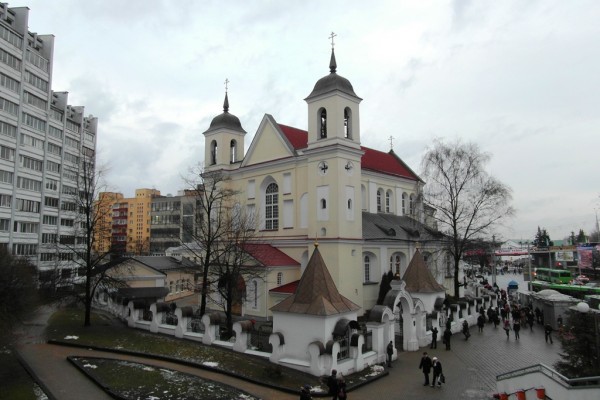
As I mentioned in my post about arriving in Minsk, I was kind of dreading Belarus. It’s not that I wasn’t looking forward to exploring and learning more about a country completely unfamiliar to me. On the contrary, I was excited and intrigued to visit a place that most Westerners don’t even have on their radar.
But I worried.
A lot.
I worried about the language barrier, which was silly because I made it through Russia for three months just fine.
I worried about getting around, which was even sillier because the Metro in Minsk is about one-tenth the size of Moscow’s and my new friend Yuliya (who I met at my hostel in Vilnius) met me at the bus station when I arrived and then served as my personal tour guide throughout my first week.
I worried because a guy from Kiev who I met in Warsaw told me not to use my mobile phone near the central square in Minsk if any protests took place because the government would trace it and arrest me (this didn’t really seriously worry me but perhaps added about 10% to my overall nervousness – besides, my phone didn’t even have a working SIM card so how would they find me?).
And I imagined Belarus would be sort of like Russia, but worse – poorer, less modern, less stable, less free.
I could not have been more wrong.
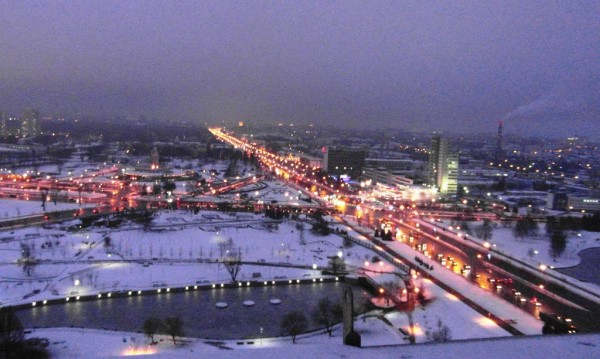
The language thing was a bit of an issue, but not for the reasons I thought.
I did not realize how different the Russian and Belarusian languages can be. And while Belarusian is the official language of Belarus, most people actually speak Russian. This leads to an odd mish-mash of languages throughout the country. Official signs tended to be in Belarusian, while advertisements were largely in Russian. The maps Yuliya gave me for each city I visited in Belarus were in Russian or showed the English translation of the Russian name, while the street signs were in Belarusian. Sometimes they were similar enough that I could figure it out, but sometimes they were vastly different.
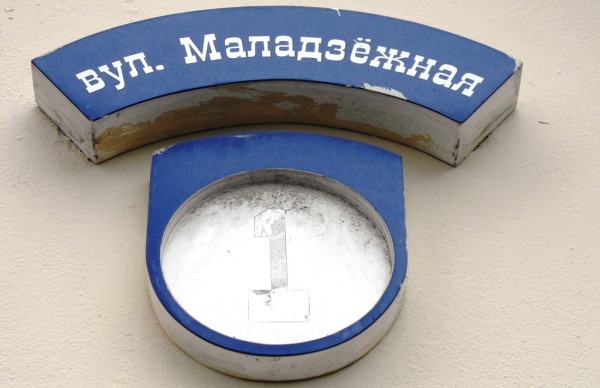
Getting around was easy – and cheap.
The main transportation hub in Minsk particularly impressed me. There, I pulled up to a newly renovated bus station, complete with numbered platforms and digital signs indicating upcoming departure times. Next door, a multi-level train station was clean, bright and warm, looking and feeling much nicer than anything I saw in Moscow or St. Petersburg. If it wasn’t for the squat toilets in the train station, I could have been in Western Europe. The Metro in Minsk was cheap (about 10 cents) and simple (just two lines) and provided access to all of the major sights in the city.
Heading to Grodno by bus was painless, with schedules clearly posted for the buses or mini-vans leaving from the central bus station at least once an hour. I really didn’t even need the schedule, though, as a driver saw me staring at a van labeled for Grodno, asked if I was going there, and then walked me to the cashier’s office to buy my ticket. A three and a half hour express mini-van cost me less than $10. Likewise, buses from Grodno to Brest seemed to run often and the six hour ride cost about $8.
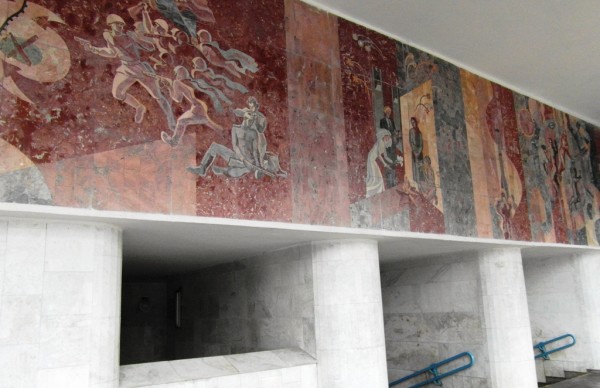
Belarus is a poor country, but it didn’t feel poor.
Inflation has been rampant and, according to Yuliya, the average salary is about $150-$300 per month (shortly after I left I saw that the government announced it may rise to $500 by the end of the year). The exchange rate between the US dollar and the Belarusian ruble has gone from about 3,000 rubles to the dollar a couple years ago to 8,450 when I arrived in early January.
But it didn’t feel poor. It’s hard to explain, but I think in some places, you can just feel the poverty surrounding you. I experienced that throughout my trip to Egypt a few years ago and I saw some of it as I rode the train through Siberia in November: dilapidated houses, crumbling pavement, yards piled with trash and shabbily dressed babushkas selling who-knows-what on the side of the road. I expected more of the same in Belarus, but aside from small glimpses in Brest, I didn’t find it – not in the heart of the capital, not in the smaller town of Grodno and not while passing through the countryside.
Interestingly enough, as we drove out of Minsk, the area just outside of the city center looked not that different from affluent suburban sprawl in the United States. Large brick houses, similar to something you might find on the North Shore of Chicago, dotted the landscape. It was shocking to see in a country so poor, but Yuliya explained how much people cheat the system so that the rich keep getting richer and the poor get poorer. That did not surprise me at all.
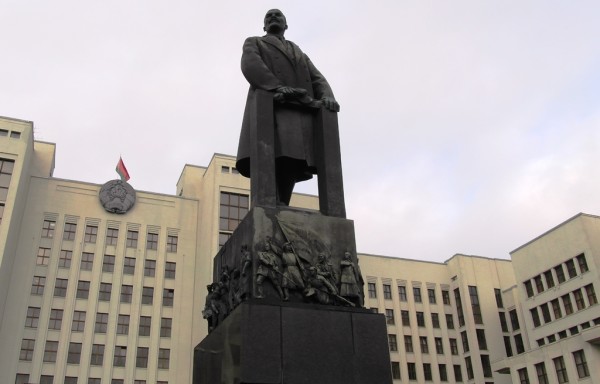
And as for freedom…
I generally felt more comfortable walking the streets of Minsk than I did in Moscow. The police presence was minimal and Yuliya confirmed that the police do not stop people randomly to check their “documents” as they often do in Moscow. Likewise, the border patrol both entering and leaving the country were friendly and smiling, something that was certainly not the case at the Russian border. At the same time, when I purchased a wi-fi card at my Minsk hotel, I noticed they tracked the cards and the guests buying them, which gave me the distinct impression that my internet use may be monitored.
I asked Yuliya about freedom in Belarus and she struggled to answer. She admitted she is free in a lot of ways to do what she wants – she can come and go as she pleases, travel abroad and even study at a university abroad. But she also pointed out the lack of freedom, particularly as it pertains to the press and expressing negative views about the government. She doesn’t see democracy ever really taking hold in Belarus and she longs to leave the country for what she believes will be a better life elsewhere in Europe (interesting side note: Yuliya’s husband Andrei told me they don’t consider Belarus to be part of Europe – they simply see themselves as former USSR).
As Yuliya and I spoke quietly in English walking through a museum, she said it was good we were talking in English because if anyone understood what we were discussing, they might take her away in handcuffs. She smiled as she said it, but I assumed she was at least partly serious.
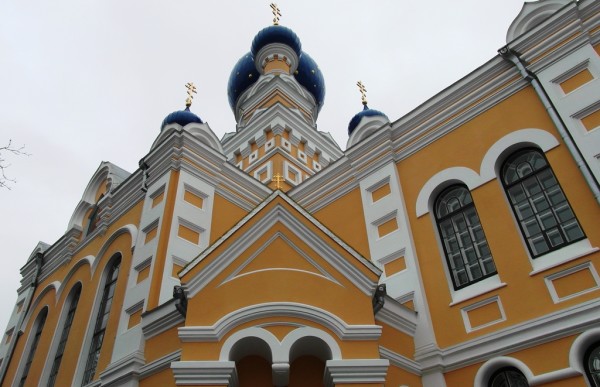
It’s hard to judge a country in 11 days
I hesitate to make sweeping generalizations about any place after visiting for less than two weeks. While I stopped in three of the main cities in Belarus – Minsk, Grodno and Brest – my time was limited and there was plenty of the country that I did not see.
But while Brest defied my expectations in a negative way, the rest of the country really impressed me and blew my expectations out of the water.
